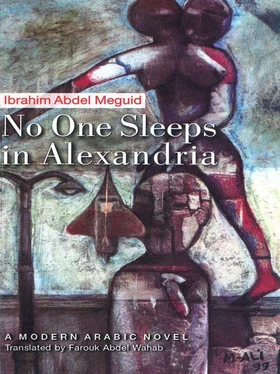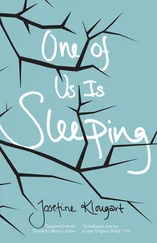The police station was a rotunda with high yellow walls, and its main gate opened onto the square where the streetcar turned. Inside a corporal with thick eyebrows sat behind an old, black wooden table; three other policemen were milling about. In a corner some rifles hung on the walls; in another corner a closed door led to the prefect’s room. The corporal fixed his glance on Magd al-Din and ordered one of the policemen to open the jail cell. He motioned Magd al-Din to approach.
“What’s your name?”
“Magd al-Din Khalil Sulayman.”
“You don’t look like the rest of the riffraff, Magd al-Din. Why don’t you have your identity card?”
“I forgot my card in the village.”
“Village? What village?”
“My village. I’ve only been in Alexandria a few days.”
“Are you a farmer?”
“Yes.”
“Here for a visit or permanent residence?”
“Residence, God willing.”
“Well, do you have five piasters? Anyone who pays the government five piasters can be released.”
“I do. Nobody asked me before,” Magd al-Din said with a sigh of relief and reached his hand into the vest under his gallabiya, took out the one-pound note, and gave it to the corporal. It was about 2 p.m. Six hours had passed since he had been thrown into the crowded cell to sit in silence with the other detainees. The corporal said he did not have change for the pound and sent a policeman to get change from a streetcar conductor. When the corporal saw that Magd al-Din had not moved, he asked him, “Why don’t you go back to the cell? Are you afraid you’ll lose the pound?”
“No,” Magd al-Din found himself saying, “but this poor idiot boy, why is in there with us?”
The corporal looked at him for a moment then smiled. “We’ll take ten piasters from you then and let him go, if that’s what you want.”
He got up from his desk, walked over to the cell, and dragged out the idiot boy, who kept staring and smiling at Magd al-Din, even twisting his neck to see him, until he was out of the precinct. Magd al-Din sat back down with the others, and the corporal locked them up again.
“Did he take a pound from you?”
“No. He asked for five piasters and sent for change. He’ll give me the change.”
“So, you have five piasters?”
“Of course — you saw I have a pound.”
“Can you believe we’re all being held here for five piasters each? Since the days of Sidqi Pasha, anyone caught without an identity card has to pay a fine of five piasters. If anybody here had five piasters in his pocket, he wouldn’t have gone to work. And you, you’re looking for work when you have a whole pound?”
Magd al-Din was surprised at what he heard. For a moment he thought of paying for all of them, then changed his mind. He needed every millieme now. “How are you getting out?” he asked.
“Same as every other time. Tonight the head of the neighborhood will come identify us and vouch for us, and we’ll get out.”
Once again silence descended. The policeman was taking his time coming back with the change. Magd al-Din squatted, his elbows on his knees and his head between his palms. Bahi was the only one who could get him out of this tight spot. He began to have the feeling that perhaps the corporal had intimated to the policeman not to return with the pound. What would happen if night fell before the policeman returned? How would Zahra feel? As he always did in times of crisis, he left it all to God. He sat down on the floor, found room to stretch out his legs, and closed his eyes for a moment. He saw himself walking on the roof of a fast-moving train, surrounded by troops of every complexion, speaking every language, carrying rifles as if they were spears, walking in sands into which their feet sank on the roof of the train. Above him and them were huge black birds, the names of which he did not know.
Magd al-Din opened his eyes, astonished by this fleeting vision. He saw the feet of the other detainees stretched out in front of him: feet resting on their heels, crossed one over the other, or spread apart, big feet that at first looked like shoes, then turned out to be bare feet, worn on the bottom, completely black on top. Some heels were so furrowed that folds of rolled, dried skin hung down from them. The toes had big outgrowths on top, more than two on each toe, with black nails grown long and bent downward over the fronts of the toes, thus forming a protective layer against unforeseen things in the street. One foot had four toes, another six, the sixth toe hanging, straight on the side, like a baby tucked onto his mother’s side, almost sliding to the ground. Amazingly, that sixth toe was clean. Nearby there was a foot that had no toes, a solid foot from which the toes had been cut by a knife, its front skin wrinkled, a foot that looked more like a rectangular block of old wood. To Magd al-Din it looked like a toothless mouth. On almost all the feet, the ankles were ringed with blue, black, or red blotches.
“These shoes on your feet, don’t they bother you?” Magd al-Din was surprised to hear the man next to him ask. Had he seen him examining the bare feet? Maybe. Maybe he wanted him to take off his shoes so he could steal them. It was the same man who had engaged him in conversation earlier. He looked closely at his face: an exhausted face with a reddish complexion that did not look healthy. Closer examination showed malnutrition and emaciation. The gaunt face had a small, pointed nose, a mouth with a downy mustache, and narrow, amber-colored eyes. His hair was black, combed with a wide-tooth comb, with a few gray hairs. On the whole, the man showed signs of a mysterious anguish. When Magd al-Din did not respond, the man went on, “I saw you looking at everyone’s feet. Being barefoot here isn’t just a sign of poverty — sometimes it’s a hobby.”
Magd al-Din’s eyes grew wider as the man continued, “You want to know why Egyptians are fond of going barefoot? You’d know if you took off your shoes. Aren’t you more comfortable when you take off your shoes?”
“Of course,” Magd al-Din replied with a smile.
“Well, some people like to be comfortable to begin with.”
The man’s voice was a little loud, so the rest of the detainees were following what was being said and laughing. “When you go into a house with no chairs, can you sit down on the floor with your shoes still on? Of course not. You take off your shoes. None of our houses have chairs.”
Magd al-Din had to laugh with the rest of the men. The corporal yelled at them to stop. Magd al-Din remembered the pound and looked at the corporal, who yelled at him, telling him to wait until “that son-of-a-bitch of a policeman” came back.
“More importantly, shoes wear out, and a man’s got to buy another pair,” the man went on. “A barefoot person, on the other hand, is self-sufficient. Every month he gets new skin on his feet— that is, a new pair of shoes. If it weren’t reprehensible, you could sell those new shoes. Remember, that’s twelve new pairs of shoes a year, all gratis, compliments of God. You can’t buy a pair of shoes for even twenty piasters.”
The laughter got more boisterous, and once again the corporal yelled at them to keep it down. Magd al-Din was now totally drawn in by the gaunt man with his peculiar talk. This man would be his friend for a long time; he would run into him often on the road. It seemed he was the one whom Magd al-Din heard calling his name early every morning. Both of them, like the rest of the detainees, had tears in their eyes from all the cheerful laughter.
Again everything grew quiet, as if a moment of meditation had been sent from heaven. They soon heard the voice of the same man who had been talking to Magd al-Din earlier, reciting in a low voice words that he obviously liked, marveling at their sad meaning, “Council of Alexandria, I am at the end of my patience. Should I speak to you in Greek or Hebrew? You take the people’s money and squander it on a bridge. Instead of sucking the people’s blood, come suck my—”
Читать дальше












